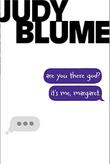It’s hard to believe, but only two of Judy Blume’s novels have been adapted for the big screen during her long and acclaimed career. The first was 1982’s Tiger Eyes, which was made into a 2012 film that Blume co-wrote with her son, Lawrence, who also directed. Now there's a new movie adaptation of what may be her most famous work: the 1970 middle-grade classic Are You There God? It’s Me, Margaret. It stars Rachel McAdams, Kathy Bates, and Ant-Man’s Abby Ryder Fortson, and it premieres in theaters on April 28.
Blume’s influence on young readers’ fiction is immeasurable, as her bestselling books fearlessly address controversial topics in sensitive and honest ways. (A new documentary on Prime Video, Judy Blume Forever, offers a wonderful overview of her work.) Are You There God, It’s Me, Margaret. is perhaps best known for its treatment of puberty, as sixth-grader Margaret Simon experiences crushes, gets her first bra, and hopes not to be last among her friends to get her period. The book’s frank talk about menstruation was unprecedented in works for young readers at the time—and those readers were thrilled to see their real-life concerns reflected in fiction.
 Many adults, however, forget that the book also dealt with other subjects: specifically, its protagonist’s spiritual soul-searching (although it’s right there in the title). At the start of the story, New York City native Margaret and her family move to suburban New Jersey, and she deals with her new stresses by frequently having one-sided conversations with God. Her mother, Barbara, was raised Christian and her father, Herb, is Jewish, as is her loving paternal grandmother, Sylvia. Margaret hasn’t chosen her own religious affiliation yet, and over the course of the story, she tries to figure out her feelings about faith. Things are further complicated by her mom’s longtime estrangement from her own parents—devout, antisemitic Christians who condemned Barbara’s marriage to a Jewish man.
Many adults, however, forget that the book also dealt with other subjects: specifically, its protagonist’s spiritual soul-searching (although it’s right there in the title). At the start of the story, New York City native Margaret and her family move to suburban New Jersey, and she deals with her new stresses by frequently having one-sided conversations with God. Her mother, Barbara, was raised Christian and her father, Herb, is Jewish, as is her loving paternal grandmother, Sylvia. Margaret hasn’t chosen her own religious affiliation yet, and over the course of the story, she tries to figure out her feelings about faith. Things are further complicated by her mom’s longtime estrangement from her own parents—devout, antisemitic Christians who condemned Barbara’s marriage to a Jewish man.
This is heady and complicated material in a book for young readers, and Blume manages it all with a sure hand. Boldly, she ends the novel with Margaret deciding to live her life without organized religion—although she still chats with God occasionally. It’s unfortunate that this part of the story is so frequently glossed over in discussions of the novel; in a nation where antisemitism is on the rise, it feels timelier than ever.
Fortunately, the new movie, written and directed by The Edge of Seventeen’s Kelly Fremon Craig, pays close attention to the religious aspects without giving short shrift to other elements of Margaret’s coming-of-age. Fortson, as Margaret, does a fine job of communicating the main character’s swirling, confusing emotions; Good Time’s Benny Safdie, as Margaret’s dad, offers a performance that’s full of warmth, wit, and strength; and Bates, as grandma Sylvia, is a reliably tough and caring presence. They’re all a pleasure to watch. However, it’s McAdams, as Margaret’s mom Barbara, who anchors the movie’s most stirring scenes; a few are simply devastating, as when she tearfully explains to Margaret why she’s never met her maternal grandparents. But she’s also wonderful in less flashy moments, when she seems amused, and a bit overwhelmed, by the fact that her kid is growing up so fast. Overall, this is a movie that’s just as complex, funny, and wise as its source material—and Blume’s many fans will know that’s high praise, indeed.
David Rapp is the senior Indie editor.



































